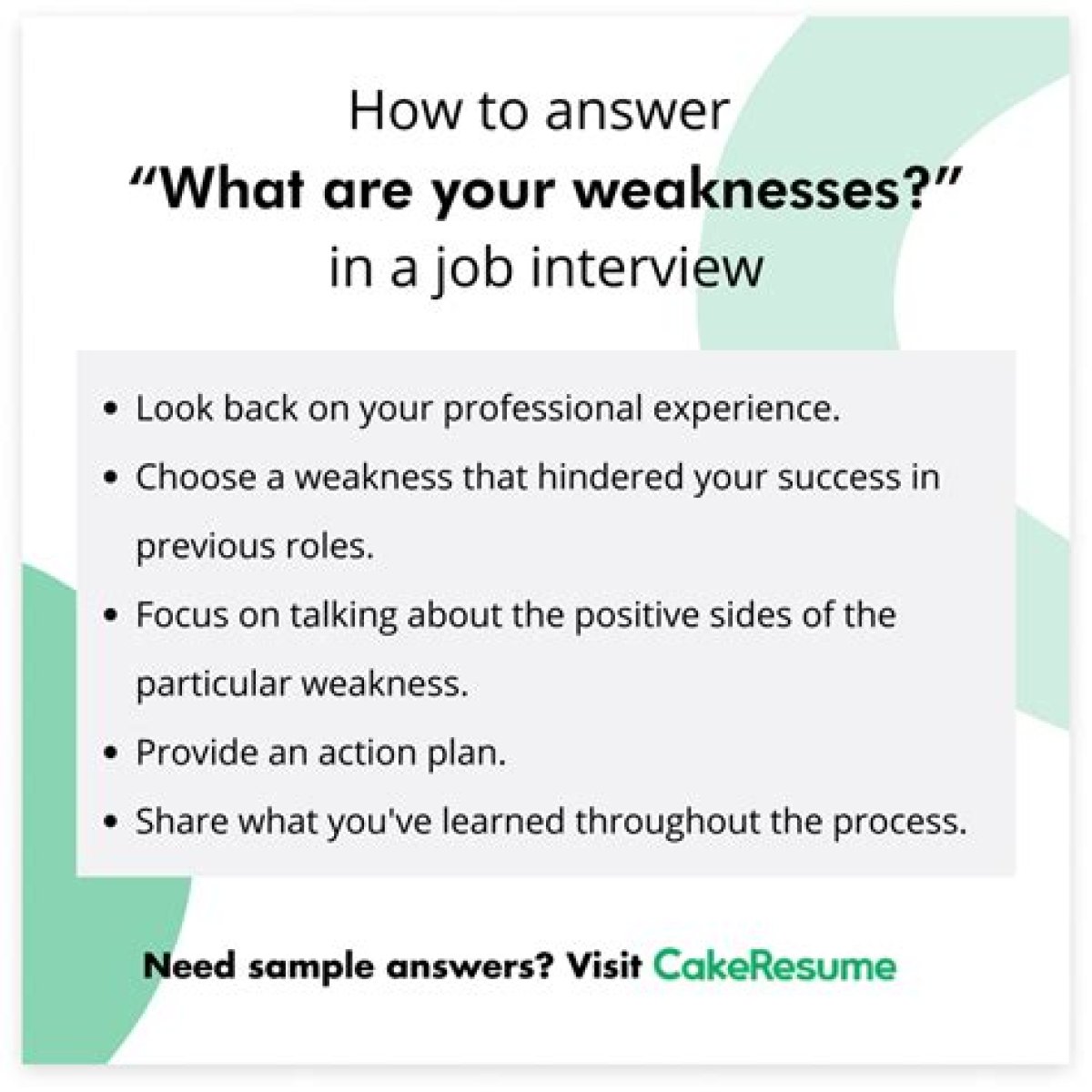- 1. What is the purpose of discussing weaknesses in a nursing interview?
- 2. How should I approach the question about weaknesses?
- 3. What qualities or skills can I mention as weaknesses in a nursing interview?
- 4. How can I demonstrate my commitment to self-improvement?
- 5. Should I discuss a weakness that is directly related to nursing?
- 6. Can I mention being a perfectionist as a weakness?
- 7. How can I ensure I don’t portray weaknesses that may disqualify me?
- 8. Can I mention a weakness that I have already overcome?
- 9. Can I mention a weakness that my references may confirm?
- 10. Should I be completely honest about my weaknesses?
- 11. How can I turn weaknesses into opportunities for growth?
- 12. Which weaknesses should I avoid mentioning in a nursing interview?
- 13. Can I mention weaknesses that are common among healthcare professionals?
- 14. How should I end my response to the weakness question?
- 15. Are there any examples of successful nurse weakness responses?
1. What is the purpose of discussing weaknesses in a nursing interview?
Discussing weaknesses in a nursing interview allows the interviewer to gauge your self-awareness and ability to reflect on areas for improvement. It also demonstrates your honesty and commitment to personal and professional growth.
2. How should I approach the question about weaknesses?
When asked about weaknesses, it is crucial to frame them in a positive light. Instead of highlighting crippling weaknesses, focus on areas where you may need additional development or opportunities for improvement.
3. What qualities or skills can I mention as weaknesses in a nursing interview?
While mentioning specific qualities or skills as weaknesses, ensure they are not essential characteristics for a nurse. Some examples could include:
– Public speaking: Mention that you sometimes feel nervous when presenting in front of a large audience, but emphasize your willingness to join relevant courses or seek guidance to improve your communication skills.– Time management: Share that you occasionally struggle with managing multiple tasks concurrently but are actively working on implementing organizational strategies and using scheduling tools to enhance your efficiency.
4. How can I demonstrate my commitment to self-improvement?
Apart from mentioning weaknesses, it is important to highlight the steps you are taking to overcome them. Talk about how you actively seek out professional development opportunities, attend relevant workshops or conferences, or engage in self-study to enhance your knowledge and skills.
It is generally advisable to avoid mentioning weaknesses directly related to nursing, as it may raise concerns about your ability to perform essential duties of the role. Instead, focus on transferrable skills or personal qualities that can be improved to enhance your overall effectiveness as a nurse.
6. Can I mention being a perfectionist as a weakness?
While aiming for perfection can be seen as a positive trait, it can sometimes hinder productivity and cause unnecessary stress. Mention that being a perfectionist may occasionally result in spending too much time on certain tasks, and highlight how you are actively working on finding the right balance between striving for excellence and meeting deadlines.
7. How can I ensure I don’t portray weaknesses that may disqualify me?
While discussing weaknesses, it is important to exercise caution and strike a balance. Avoid mentioning weaknesses that could potentially jeopardize patient safety, such as medication administration or critical thinking. Focus on areas that are not critical to the role but can still be improved upon.
8. Can I mention a weakness that I have already overcome?
It is acceptable to discuss weaknesses that you have already overcome, as it highlights your ability to identify areas for improvement and take initiative to address them. Share the steps you took to conquer that weakness, demonstrating your commitment to personal growth.
9. Can I mention a weakness that my references may confirm?
It is generally recommended not to mention a weakness that may be confirmed by your references, as it can raise doubts about your self-awareness and ability to improve. Choose weaknesses that are relatively minor and where you have a clear plan for improvement.
10. Should I be completely honest about my weaknesses?
While it is important to be honest in an interview, it is also crucial to strategically present your weaknesses. Rely on self-reflection and choose weaknesses that are genuine, not disqualifying, and can be confidently addressed with the right approach and support.
11. How can I turn weaknesses into opportunities for growth?
When discussing weaknesses, emphasize your willingness to learn, grow, and harness opportunities for self-improvement. Highlight how you seek feedback from mentors or supervisors and actively implement their suggestions to strengthen your skills.
12. Which weaknesses should I avoid mentioning in a nursing interview?
Avoid discussing weaknesses that are critical to nursing, such as lack of empathy, poor communication, inability to handle stress, or difficulty working in a team. Focus on weaknesses that are not central to the role but can still be improved upon.
13. Can I mention weaknesses that are common among healthcare professionals?
While it is acceptable to mention weaknesses that are common among healthcare professionals, such as work-life balance or occasional difficulty in disconnecting emotionally, it is important to emphasize your efforts to maintain a healthy work-life balance and implement effective coping mechanisms.
14. How should I end my response to the weakness question?
After discussing your weakness, wrap up your response by reiterating your commitment to growth, emphasizing your willingness to learn and develop in order to provide the highest standard of care to patients.
15. Are there any examples of successful nurse weakness responses?
“I sometimes struggle with delegating tasks as I have a strong desire to take full responsibility for patient care. However, I have been actively working on improving my delegation skills by attending workshops and seeking guidance from experienced colleagues. I understand that effective delegation contributes to better patient outcomes and teamwork within the healthcare setting.”
